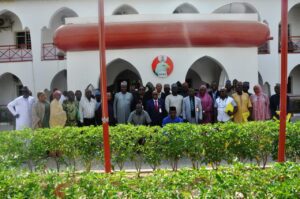News
EFCC Urges Journalists To Use Investigative Reporting To Expose Corrupt Practices

By Stella Akupue and Salihu Ali, Abuja.
Nigeria’s Anti-graft Agency, the Economic and Financial Crimes Commission, EFCC, has called on journalists in the Northeast to be proactive and use the tools of investigative journalism to expose corrupt practices, especially money laundering and financing of terrorism.
The Executive Chairman of the Commission, Abdulrasheed Bawa, made the plea in Maiduguri at a one-day workshop on Effective Reporting of Economic and Financial Crimes for Journalists covering the activities of the Commission.
Bawa, who spoke through Commander, Maiduguri Zonal Command of the Commissioner Mr. Oshodi Johnson, urged the participants to be alive to their responsibilities as members of the fourth estate of the realm and ask questions where corrupt practices were suspected.
Use Investigative Reporting To Expose Corrupt Practices
He drew the attention of the journalists to the new anti-money laundering framework. He urged them to communicate with the new laws to better inform the public and other stakeholders.
Bawa said, “The Money Laundering (Prevention and Prohibition) Act, 2022, Proceeds of Crime (Recovery and Management) Act, 2022 and the Terrorism (Prevention and Prohibition) Act, 2022 are new legislations designed to prevent and tackle illicit financial flows and money laundering in Nigeria”.
Journalists cautioned against the dissemination of fake news: NUJ.
He further urged journalists to monitor the activities of Designated Non-Financial Businesses and Professions, DNFBPs to determine their level of compliance with their obligations to the Special Control Unit Against Money Laundering, SCUML, under the Money Laundering (Prevention and Prohibition) Act, 2022, and the Terrorism (Prevention and Prohibition) Act, 2022.
Bawa pointed out that Section 56 of the Terrorism Act empowers SCUML, now fully domiciled in the EFCC, to refuse or revoke the registration of any NGO linked to terrorist groups.
EFCC Urges Journalists To Use Investigative Reporting To Expose Corrupt Practices
During the workshop, Mr Chris Mshelia presented a paper on an overview of the anti-money laundering framework, drawing attention to the essential provisions of the new Money Laundering Act 2022 and the obligations for individuals and corporate bodies, while Mr Obiageli Okechukwu spoke on Digital Payment Statement: Emerging Opportunities for Fraud and Prevention Tips for Victims.
Assistant Director, Public Affairs, EFCC Dele Oyewale, spoke on “Investigative Journalism and Nigeria’s Fight against Money”. He charged the Nigerian media to focus on investigative and developmental journalism rather than sensational news.
He says, “The fight against corruption can be won if you journalists discharge your responsibilities professionally by engaging in investigative journalism focusing on social justice and accountability.
Click Button Below to Join Our Telegram Groups

For Advert Inquiries & News/Article Publishing
Call:+2348033888791, +2347069999005
E-mail: legalattorneyblog01@gmail.com





















